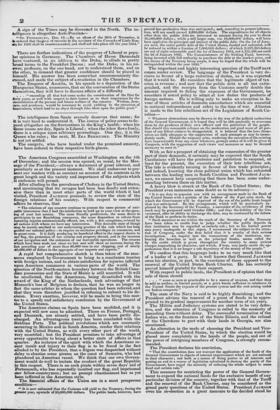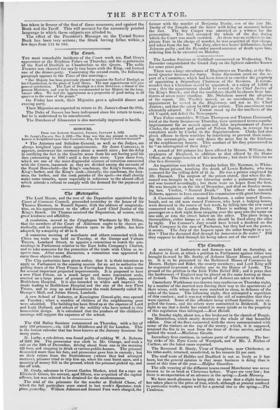The American Congress assembled at Washington on the 5th of
December; and the session was opened, as usual, by the Mes- sage of the President,—always a document of great interest, and peculiarly so at the present moment. We shall endeavour to pre- sent our readers with as succinct an account of its contents as its great length and the variety and importance of the subjects which it embraces will permit.
After alluding to the prevalence of Cholera in the United States, and mentioning that its ravages had been less deadly and exten- sive there than in most other parts of the world which it had 'visited, President JACKSON proceeds to review the state of the foreign relations of his country. With respect to commercial affairs he observes, that
a The relations of our country continue to present the same picture of ami- cable intercourse that I had the satisfaction to hold up to your view at the open- ing of your last session. The same friendly professions. the same desire to participate in our flourishing commerce, the same disposition to refrain from resenting injuries unintentionally offered, are, with a few exceptions, evinced by all nations with whom we have any intercourse. This desirable state of things may be mainly ascribed to our undeviating practice of the rule which has long guided our national policy—to require no exclusive privileges in commerce, and to grant none. It is daily producing its beneficial effect in the respect shown to our flag, the protection of our citizens and property abroad, and in the increase of our navigation and the extension of our mercantile operations. The returns which have been made out since we last met will show an increase during the last preceding year of more than 80,000 tons in our shipping, and of nearly 40,000,000 of dollars in the aggregate of our imports and exports."
A rapid but comprehensive sketch is then taken of the mea- sures employed by Government to bring to a conclusion treaties with foreign nations, and to obtain satisfaction for injuries inflicted upon American commerce in various parts of the world. The question of the North-eastern boundary between the British Cana- dian possessions and the State of Maine is still unsettled. It will be recollected, that the Americans, being dissatisfied with the award of the King of the Netherlands, took advantage of that Monarch's loss of Belgium to declare, that he was no longer in fact the same arbiter to whom the question had been referred, and that they were therefore justified in refusing to submit to his de- cision. Every exertion, however, will be made to bring this mat- ter to a speedy and satisfactory conclusion by the Government of the United States.
The American claims on Spain have been modified, and it is expected will now soon be admitted. Those on France, Portugal, and Denmark, are already settled, and have been partly dis- charged. An advantageous treaty has been concluded with the Sublime Porte. The political revolutions which are constantly occurring in Mexico and in South America, render their relations with the United States, as with every other part of the world, very unsettled ; but the President promises to take advantage of every opportunity to bring about a better state of affairs in that quarter. An instance of the spirit with which the Americans re- sent insult and injury to their flag is to be found in the fact alluded to by the President, that a frigate was despatched without delay to chastise some pirates on the coast of Sumatra, who had plundered an American vessel. We think that our own Govern- ment would do well to imitate the conduct of the great Republic in this respect. There is an arch pirate within seven days' sail of Portsmouth, who has repeatedly insulted our flag, and imprisoned • our fellow-countrymen; but no prompt chastisement has as yet been inflicted in the American style.
The financial affairs of the Union are in a most prosperous condition- " It is now estimated that the Customs will yield to the Treasury, during the resent year, upward, 0128,000,000 dollars. The public lands, however, have proved less productive than was anticipated; and, according to present informa- tion, will not much exceed 2,000,000 dollars. The expenditures for all objects other than the public debt are estimated to amount during the year to about 16,500,000 dollars ; while a still larger sum viz. 18,000,000 dollars, will have - been applied to the principal and interest of le public debt. On the let of Janu- ary next, the entire public debt of the United States, funded and unfunded, will be reduced to within a fraction of 7,000,000 dollars; of which 2,227,263 dollars are not of right redeemable until the 1st ofJanuary 1834, and 4,735,296 not until . the 2d of January 1835. The Commissioners of the Sinking Fund, however, being invested with full authority to purchase the debt at the market-price, and the means of the Treasury being ample, it may be hoped that the whole will be extinguished within the year I833.'
The important and highly interesting question of the Tariff next comes under review. The language of the President is very de- cisive in favour of a large reduction of duties, as it was expected that it would be. He considers that the legitimate object of tax ation is revenue ; and now that the public debt is all but extin- guished, and the receipts from the Customs nearly double the • amount required to defray the expenses of the Government, he considers it sound policy to admit at low duties the products of ' foreign nations. He is willing only to make an exception in fa- your of those articles of domestie manufacture which are essential to national independence and safety in the time of war. Allusion is made to the late rebellious act of the Legislature of South Ca- • rolina-
" Whatever obstructions may be thrown in the way of the judicial authorities . of the General Government, it is hoped they will be able peaceably to overcome - them by the prudence of their own officers and the patriotism of the people. But should this reasonable reliance on the moderation and good sense of all por- tions of our fellow-citizens be disappointed, it is believed that the laws them- selves are fully adequate to the suppression of such attempts as may be imme- diately made. Should the exigency arise, rendering the execution of the existing laws impracticable from any cause whatever, prompt notice of it will he given to Congress, with the suggestion of such views and measures as may be deemed necessary to meet
With so fair a prospect of obtaining the concession of the greater part of their demands, it certainly may be expected that the South Carolinians will have the prudence and patriotism to suspend, at least for the present, the execution of their late rebellious act. The tide is evidently turning in favour of free trade principles; and indeed, knowing the close political union which has subsisted between the leading men in South Carolina and President JACK- SON, we cannot help suspecting that there has been some under- standing between them on this matter. A heavy blow is struck at the Bank of the United States; the President even insinuates some doubt as to its solvency- " It is my duty to acquaint you with an arrangement made by the Bank of the United States with a portion of the holders of the 3 per cent, stock, by which the Government will be deprived of the use of the public funds longer than was anticipated. By this arrangement, which will be particularly ex • plained by the Secretary of the Treasury, a surrender of the certificates of this stock may be postponed until October 1833; and thus the liability of the Go- vernment, after its ability to discharge the debt, may be continued by the failure of the Bank to perform its duties.
"Such measures as are within the reach of the Secretary of the Treasury have been taken to enable him to judge whether the public deposits in that institution may be regarded as entirely safe ; but as his limited power may prove inadequate to this object, I recommend the subject to the atten- tion of Congress, under the firm belief that it is worthy of their serious investigation. Au inquiry into the transactions of the institution, em- bracing the branches as well as the principal banks, seems calledfor by the credit which is given throughout the country to _many serious charges impeaching its character, and which, if true, may justly excite the ap- prehension that it is no longer a safe depository of the money of the people."
We confess that this language looks to us very much like that of a leader of a party. It is well known that General JACKSON owes his election, in part, to the exertions of those opposed to the renewal of the United States Bank Charter. He has certainly proved himself grateful for their support. With respect to public lands, the President is of opinion that the sale of them should . . . "cease as soon as practicable to be a source of revenue, and that they be sold to settlers, in limited parcels, at a price barely sufficient to reimburse to the United States the expense of the present system and the cost arising under our Indian compacts."
The state of the Navy is said to be highly flourishing; and the President advises the renewal of a grant of funds to be appro- priated to its gradual improvement for another term of six years. The Militia and Judiciary systems are stated to be very defec- tive, and the attention of Congress is called to the necessity of amending them without delay. The successful termination of the Indian war, on the frontiers of the State Illinois, and the refusal of the Cherokees to part with their lands in Georgia, are also mentioned.
An alteration in the mode of choosing the President and Vice- President of the United States, by which the election would be placed more completely in the hands of the people, and out of' the power of intriguing members of Congress, is strongly recora-- mended.
The President declares his conviction,
"That the constitution does not warrant the application of the funds of the- General Government to objects of internal improvement which are not national in their character; and both as a means of doing justice to all interests and putting an end to a course of legislation calculated to destroy the purity of the Government, have urged the necessity of reducing the whole subject to some fixed and certain rule."
This measure for restricting the power of the General Govern- ment to expend the national funds for the exclusive benefit of any particular division of the country, together with that of the-Tariff and the renewal of the Bank Charter, may be considered as the • grand party questions of the United States. President JACKSON owes his re-election in a great measure to the decided stand he las taken in favour of the first of these measures, and against the Bank and the Tariff. This will account for the unusually pointed language in which these subjects are alluded to. The effect of the President's Message on the United States Bank has been very serious; the Stock having fallen within :a few days from 115 to 104.























 Previous page
Previous page